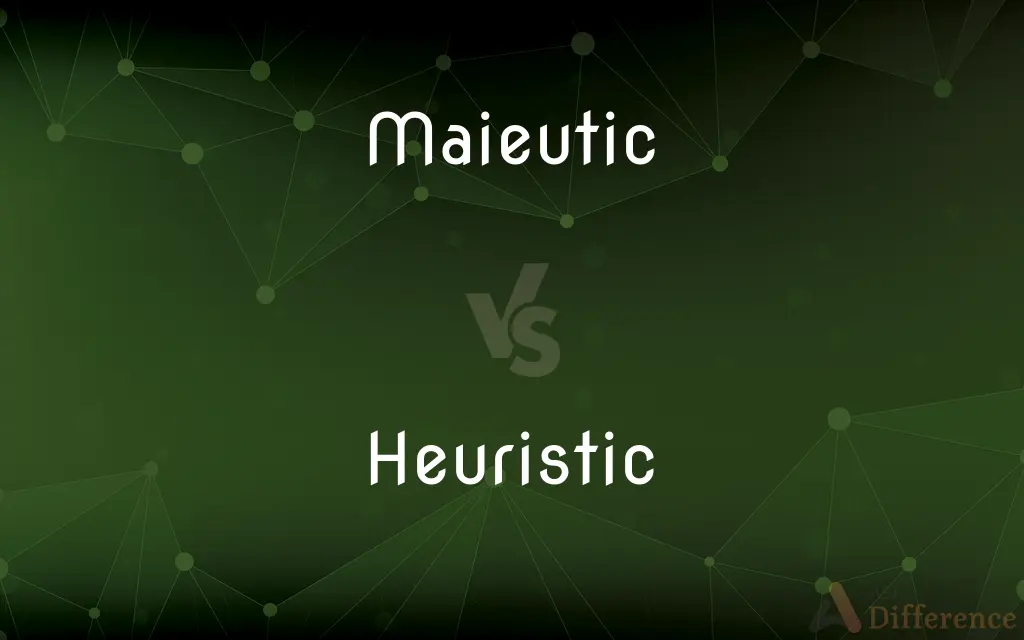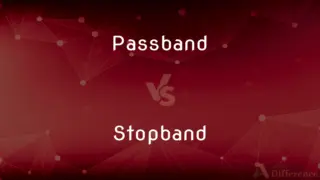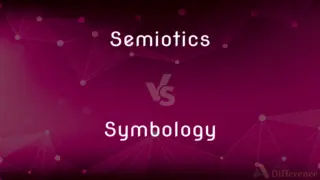Maieutic vs. Heuristic — What's the Difference?
Edited by Tayyaba Rehman — By Maham Liaqat — Updated on April 5, 2024
Maieutic involves guiding someone to discover knowledge through questioning, resembling Socratic dialogue, while heuristic refers to a problem-solving approach that employs practical methods or shortcuts for finding solutions.

Difference Between Maieutic and Heuristic
Table of Contents
ADVERTISEMENT
Key Differences
Maieutic methods are deeply rooted in the Socratic tradition, focusing on engaging individuals in dialogues that stimulate critical thinking and self-reflection, leading to the discovery of truths or insights. This educational approach relies on asking probing questions that encourage learners to examine their beliefs and knowledge critically. In contrast, heuristic approaches are utilized across various disciplines as practical shortcuts or "rules of thumb" that facilitate problem-solving or learning. Heuristics simplify complex decision-making processes, offering efficient, if not always perfect, solutions.
While the maieutic method seeks to uncover knowledge by guiding someone to realize it from within themselves, heuristics are often externally applied principles or strategies used to expedite the process of reaching a satisfactory solution. The former is more introspective and reflective, focusing on the process of understanding, whereas the latter is outcome-oriented, emphasizing efficiency and speed in achieving results.
The effectiveness of the maieutic approach hinges on the individual's ability to engage deeply with the questions posed, making it a highly personalized form of learning or discovery. It emphasizes the importance of the journey towards knowledge. On the other hand, heuristics, by their nature, are designed to be universally applicable, making them versatile tools that can be applied in a wide range of scenarios without the need for deep personal reflection.
In education, the maieutic method can foster a profound understanding and personal ownership of knowledge, as it encourages students to construct understanding through dialogue and inquiry. Conversely, heuristic methods are often employed in educational settings to teach problem-solving techniques that students can quickly apply to new problems, thereby promoting a more pragmatic approach to learning.
In the realm of problem-solving, heuristics play a critical role in fields such as computer science, psychology, and mathematics, where they help navigate complex problems more manageably. The maieutic method, while not typically associated with these fields in a direct problem-solving capacity, offers valuable insights into the philosophical or ethical considerations underlying certain problems or decisions, illustrating the complementary nature of these approaches in broader intellectual and practical contexts.
ADVERTISEMENT
Comparison Chart
Definition
A method of inquiry and teaching that uncovers knowledge through guided questioning.
A problem-solving approach using practical methods or shortcuts.
Origin
Rooted in the Socratic tradition of dialogue.
Derived from various disciplines for efficiency in problem-solving.
Focus
Encourages introspection and personal discovery of truths.
Aims at finding quick and efficient solutions to problems.
Application in Learning
Facilitates deep understanding and reflective learning.
Teaches practical problem-solving skills and techniques.
Nature
Personalized and reflective.
Universal and pragmatic.
Compare with Definitions
Maieutic
A dialectical method of inquiry that elicits knowledge through questioning.
The teacher used a maieutic approach, prompting students to explore and articulate their understanding of historical events.
Heuristic
A problem-solving approach that employs practical methods or shortcuts.
Designers use heuristic evaluation to quickly identify usability issues in a prototype.
Maieutic
Focuses on self-discovery and critical thinking.
The maieutic method in therapy encourages clients to uncover their own insights into personal issues.
Heuristic
Aimed at efficiency and speed in decision-making.
Heuristic algorithms in computer science provide quick solutions to complex computational problems.
Maieutic
Emphasizes the process of learning over the content.
In a maieutic session, the journey of questioning is valued more than the final answer.
Heuristic
Can lead to approximate or satisficing solutions.
In a time-crunch, emergency responders rely on heuristics to make life-saving decisions.
Maieutic
Promotes deep understanding through dialogue.
Philosophical discussions often employ maieutic techniques to delve into complex ideas.
Heuristic
Widely used across disciplines for its practicality.
Psychologists study heuristics to understand how people make everyday decisions.
Maieutic
Tailored to individual experiences and perspectives.
Maieutic questioning adapts to each learner’s thought process, making it a highly personalized educational tool.
Heuristic
Applies "rules of thumb" for solving problems.
Investors often use heuristics to make quick stock market decisions.
Maieutic
Of or relating to the aspect of the Socratic method that induces a respondent to formulate latent concepts through a dialectic or logical sequence of questions.
Heuristic
A heuristic (; from Ancient Greek εὑρίσκω (heurískō) 'I find, discover'), or heuristic technique, is any approach to problem solving or self-discovery that employs a practical method that is not guaranteed to be optimal, perfect, or rational, but is nevertheless sufficient for reaching an immediate, short-term goal or approximation. Where finding an optimal solution is impossible or impractical, heuristic methods can be used to speed up the process of finding a satisfactory solution.
Maieutic
(philosophy) Of or related to the Socratic method.
Heuristic
Of or relating to a usually speculative formulation serving as a guide in the investigation or solution of a problem
"The historian discovers the past by the judicious use of such a heuristic device as the 'ideal type'" (Karl J. Weintraub).
Maieutic
(uncommon) Obstetric]]: of or related to childbirth.
Heuristic
Of or constituting an educational method in which learning takes place through discoveries that result from investigations made by the student.
Maieutic
Midwifery.
Heuristic
(Computers) Relating to or using a problem-solving technique in which the most appropriate solution of several found by alternative methods is selected at successive stages of a program for use in the next step of the program.
Maieutic
Serving to assist childbirth.
Heuristic
A heuristic method or process.
Maieutic
Aiding, or tending to, the definition and interpretation of thoughts or language.
Heuristic
Heuristics (used with a sing. verb) The study and application of heuristic methods and processes.
Heuristic
(of an approach to problem solving, learning, or discovery) That employs a practical method not guaranteed to be optimal or perfect; not following or derived from any theory.
Heuristic
That provides a useful, but not optimal, solution to a problem. Such algorithms are typically employed either because the only known algorithms that provide optimal solutions use too much time or resources, or else because there is no known algorithm that provides an optimal solution.
Heuristic
(of an argument) That reasons from the value of a method or principle that has been shown by experimental investigation to be a useful aid in learning, discovery and problem-solving.
Heuristic
A heuristic method.
Heuristic
The art of applying heuristic methods.
Heuristic
(computing) A heuristic algorithm or method.
Heuristic
Serving to promote discovery or learning; - used especially of thories or paradigms which stimulate new ideas for discovering facts in experimental sciences.
Heuristic
Serving to stimulate people to learn and discover on their own, especially by encouraging experimental and trial-and-error methods for solving problems.
Heuristic
Pertaining to or based on trial-and-error and experimental methods of learning and evaluation.
Heuristic
Based on the use of an efficient trial-and error method to search a space of possible solutions to a problem, or to find an acceptable approximate solution, when an exact algorithmic method is unavailable or too time-consuming.
Heuristic
A heuristic method; a specific heuristic procedure.
Heuristic
A theory or approach which serves to promote discovery or learning by encouraging experimentation.
Heuristic
A commonsense rule (or set of rules) intended to increase the probability of solving some problem
Heuristic
Of or relating to or using a general formulation that serves to guide investigation
Common Curiosities
How do heuristic methods work?
Heuristic methods work by applying practical shortcuts or "rules of thumb" to quickly find solutions to problems, emphasizing efficiency over perfect accuracy.
Can the maieutic method be applied in all learning environments?
While effective in fostering deep understanding, the maieutic method is most suited to environments where dialogue and personal reflection are feasible and encouraged.
What is the maieutic method?
The maieutic method is an educational technique that guides learners to discover knowledge for themselves through questioning, inspired by Socrates.
Are heuristics reliable?
Heuristics are generally reliable for quickly arriving at satisfactory solutions, though they may not always lead to the optimal outcome.
How do maieutic and heuristic approaches differ in their application?
Maieutic approaches focus on introspective discovery and understanding through guided questioning, while heuristics are applied more broadly for practical problem-solving across various fields.
Can heuristic methods be used in education?
Yes, heuristic methods are often used in education to teach students practical problem-solving skills that can be applied in diverse situations.
Are there specific areas where heuristics are particularly useful?
Heuristics are especially useful in fields requiring quick decision-making, such as computer science, psychology, and emergency management.
How does the maieutic method benefit personal growth?
It promotes critical thinking, self-awareness, and the ability to articulate one's thoughts and beliefs clearly, contributing to personal and intellectual growth.
What is the main goal of the maieutic method?
The main goal is to help individuals reach a deeper understanding or realization of knowledge through a process of self-discovery facilitated by questioning.
What are the limitations of heuristic approaches?
While efficient, heuristic approaches may not always lead to the most accurate or optimal solutions and can be susceptible to biases.
Share Your Discovery

Previous Comparison
Passband vs. Stopband
Next Comparison
Semiotics vs. SymbologyAuthor Spotlight
Written by
Maham LiaqatEdited by
Tayyaba RehmanTayyaba Rehman is a distinguished writer, currently serving as a primary contributor to askdifference.com. As a researcher in semantics and etymology, Tayyaba's passion for the complexity of languages and their distinctions has found a perfect home on the platform. Tayyaba delves into the intricacies of language, distinguishing between commonly confused words and phrases, thereby providing clarity for readers worldwide.











































